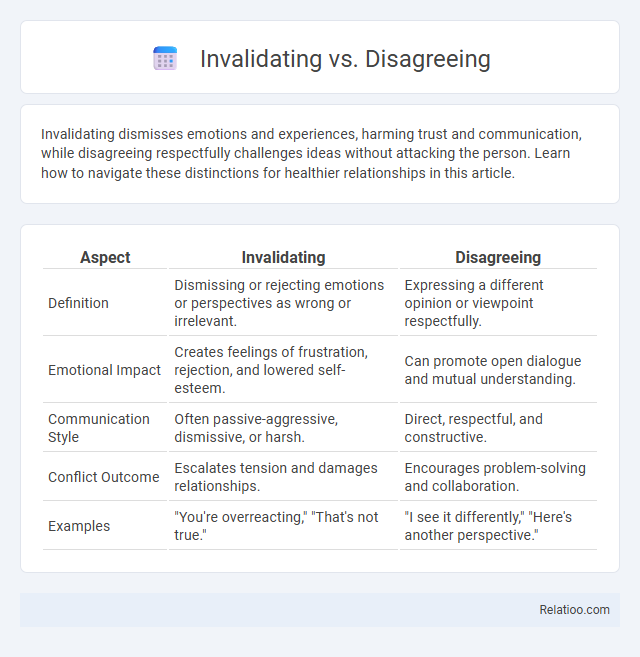Invalidating dismisses emotions and experiences, harming trust and communication, while disagreeing respectfully challenges ideas without attacking the person. Learn how to navigate these distinctions for healthier relationships in this article.
Table of Comparison
| Aspect | Invalidating | Disagreeing |
|---|---|---|
| Definition | Dismissing or rejecting emotions or perspectives as wrong or irrelevant. | Expressing a different opinion or viewpoint respectfully. |
| Emotional Impact | Creates feelings of frustration, rejection, and lowered self-esteem. | Can promote open dialogue and mutual understanding. |
| Communication Style | Often passive-aggressive, dismissive, or harsh. | Direct, respectful, and constructive. |
| Conflict Outcome | Escalates tension and damages relationships. | Encourages problem-solving and collaboration. |
| Examples | "You're overreacting," "That's not true." | "I see it differently," "Here's another perspective." |
Understanding Invalidating and Disagreeing
Understanding invalidating involves recognizing when someone's thoughts or feelings are dismissed or rejected, often causing emotional harm and undermining their self-worth. Disagreeing, in contrast, means expressing a differing opinion or perspective without dismissing the validity of the other person's experience. Differentiating these concepts is crucial for healthy communication, fostering respect and emotional safety rather than conflict or alienation.
Key Differences Between Invalidating and Disagreeing
Invalidating dismisses or undermines Your feelings, making you feel unheard or disrespected, while disagreeing simply presents a different opinion without negating your experience. The key difference lies in intention: invalidation attacks the validity of emotions, whereas disagreement challenges ideas or viewpoints. Recognizing this distinction helps maintain respectful communication and emotional safety during conflicts.
The Psychology Behind Invalidating Responses
Invalidating responses undermine your feelings by dismissing or rejecting your emotional experience, often leading to confusion and lowered self-esteem. Disagreeing involves expressing a differing opinion without necessarily negating the validity of your emotions, whereas invalidation disregards or belittles your perspective entirely. The psychology behind invalidating responses reveals how these interactions disrupt emotional regulation and can contribute to increased psychological distress and relational conflicts.
How Disagreement Can Be Constructive
Disagreeing involves expressing a differing opinion or perspective while maintaining respect for the other person's viewpoint, fostering open communication and collaborative problem-solving. Constructive disagreement encourages critical thinking and innovation by challenging ideas without attacking the individual, thus avoiding invalidation, which dismisses or undermines emotions and experiences. Effective disagreement promotes understanding and growth, reducing conflict by validating feelings even when opinions diverge.
Effects of Invalidating on Relationships
Invalidating emotions or experiences in relationships undermines trust and emotional safety, often leading to increased conflict and emotional withdrawal. Unlike simply disagreeing, which involves expressing a differing opinion without rejecting feelings, invalidation dismisses or negates the validity of another's feelings, causing feelings of worthlessness or frustration. Persistent invalidation can deteriorate communication, reduce empathy, and increase the risk of relationship dissatisfaction and breakdown.
Recognizing Signs of Invalidation in Conversation
Recognizing signs of invalidation in conversation involves noticing dismissive comments, minimizing your feelings, or outright rejecting your experience, which goes beyond simple disagreement. While disagreeing addresses differing opinions or facts, invalidation undermines your emotions and self-worth, leading to confusion and emotional distress. You can protect your mental well-being by identifying these subtle cues and advocating for respectful, validating communication.
Healthy Ways to Express Disagreement
Expressing disagreement healthily involves acknowledging the other person's perspective without dismissing their feelings, which contrasts with invalidation that undermines or negates someone's experience. Techniques such as active listening, using "I" statements, and focusing on specific behaviors rather than personal attacks promote constructive dialogue. Avoiding invalidation fosters emotional safety and mutual respect, essential for resolving conflicts and maintaining strong relationships.
Overcoming the Urge to Invalidate Others
Overcoming the urge to invalidate others requires recognizing the difference between disagreeing and invalidating; disagreement respects differing opinions, while invalidation dismisses or undermines feelings. You can foster healthier communication by actively listening and validating emotions without necessarily agreeing, which builds trust and empathy. Cultivating this awareness helps prevent emotional harm and promotes constructive dialogue in relationships.
Fostering Respectful Dialogue Amid Differences
Invalidating dismisses your feelings or experiences, undermining trust and openness in communication, while disagreeing simply expresses a different opinion without negating your perspective. Invalidation occurs when someone's views are rejected or belittled, hindering respectful dialogue and mutual understanding. Fostering respectful conversations requires recognizing these distinctions to create a safe space where diverse viewpoints are valued and constructive exchange thrives.
Practical Tips to Avoid Invalidating Language
Invalidating language dismisses or undermines your feelings, while disagreeing respectfully acknowledges differing opinions without negating emotions. To avoid invalidation, use active listening, validate emotions by reflecting feelings back, and express your perspective without negating others' experiences. Practicing empathy and using phrases like "I see why you feel that way" can help maintain open and supportive communication.

Infographic: Invalidating vs Disagreeing
 relatioo.com
relatioo.com